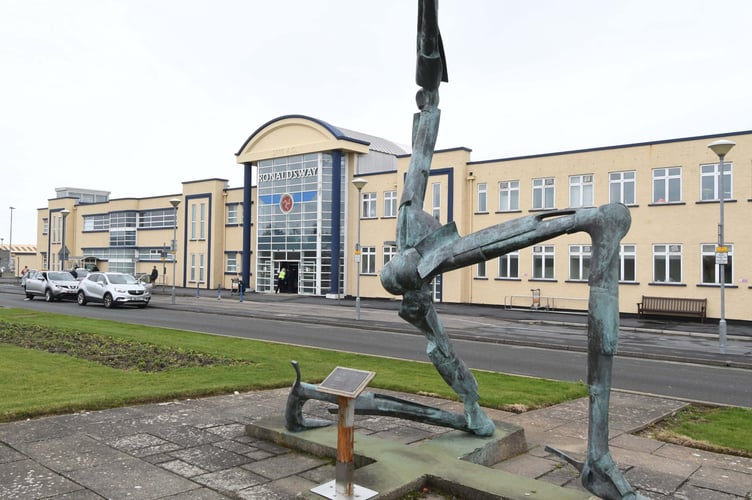Further flight disruption looms as runway closures continue at Ronaldsway left ‘fragile’ by staff shortages in air traffic control.
The problems which left many passengers frustrated last summer may have eased but they haven’t gone away – and they could become more noticeable again when the airlines’ summer schedules resume in April, according to airport director Gary Cobb.
But he said he is hopeful that fatigue breaks can be lifted altogether later this year.
He said: ‘We are fragile but we are in a better place than we were last year and if things continue as they are then next year we will be in a far better place.
‘I can completely understand people’s frustrations. No airport director wants to close but no airport director wants to put so much pressure on his team that they cause a safety incident.’
The airport took the unprecedented step of closing the runway five times a day back in June last year following a staff medical issue in air traffic control.
‘We had a choice - we could either introduce closures to allow training to continue or not have any training,’ said Mr Cobb.
The situation eased when the medical issue in the control tower was resolved. Last August the number of fatigue breaks went down from five to two - 8.30am to 9.05 and 11am to 11.30am.
But since then, the situation in ATC has not changed. It has become less noticeable simply because there has been a reduction in air services over the winter.
Mr Cobb said: ‘Winter schedules typically take quite a lot of pressure out of the system. Airlines have more aircraft spare to be able to cope with other issues that happen in their wider network. As more pressure is put into the system and more sectors are being flown by the same aircraft, more of them are likely to encroach into that break time.’

At the time the airport went down to two closures it had 14 staff with air traffic control in their title but only eight that were fully validated for operational roles. Today it has 17 air traffic control officers with nine fully validated.
Since Mr Cobb was appointed in August 2022, the airport has recruited three students and three experienced ATCOs. One has left, leaving two experienced ATCOs to go through training, and the three students pencilled in to go to college.
The airport director said: ‘We took the decision to put closures in and allow training to continue. It takes up to eight months to get valid in a rating. I’m hoping we will have two ATCOs fully validate this year.
‘We are six months further on with our training to the point where hopefully later this year we will have validations where the fatigue breaks can be lifted.’
But he said he was hesitant to give a date for this as it was dependent upon the ATCO recruits passing their validation exams.
Mr Cobb said there had been a number of options regarding breaks that could have been introduced – for example, the airport could have only closed at weekends, or been open six-seven hours a day with no breaks.
He said the decision on closures was taken in association with the airlines which had agreed while not ideal, it was the best way forward.
Other airports had done the same – Newcastle for example also implemented 30 minute breaks while in the summer of last year, Gatwick took another course and capped its volumes, resulting in some 1,000 flights being cancelled.
During the winter, airlines have reduced their services, with aircraft movements down by possibly as much as 30%. EasyJet has slimmed down its Liverpool and Manchester services and come off the Belfast and Bristol routes.
With the return of the summer schedule, Mr Cobb said the ATC issues will become more noticeable.
But he pointed out that some of the widely reported problems like the cancellation of easyJet’s late night Gatwick flights has ‘absolutely nothing to do with our air traffic control’. He said the issues were typically to do with Gatwick or European air traffic control and the aircraft was picking up delays earlier in their schedule.
Mr Cobb insisted that a 30 minute air traffic control break will only delay your flight by 30 minutes, But there can be a multiplier effect where for example a flight can’t get a slot back into London City or Gatwick.
‘It becomes an aggregating factor. It’s very difficult to say which one caused which because it might have already had that delay,’ he said. ‘A pilot might legitimately sit there in the Isle of Man and say, sorry, there’s a delay, it’s an ATC issue. But they might not mean our ATC.
‘Don’t get me wrong - 30 minute breaks will have an impact. You can’t get away from the fact that the airport runs smoother if it didn’t have 30 minute breaks.’
The airport director said air traffic control staff shortages were a global issue.
During Covid there was no air traffic and so no training. Before Brexit Ronalsdway could recruit ATCOs from within Europe but since the UK left the European Union, the only licences accepted are British. ‘Basically, everyone is robbing each other’s ATCOs,’ he said.

-(2).jpeg?width=209&height=140&crop=209:145,smart&quality=75)

.jpeg?width=209&height=140&crop=209:145,smart&quality=75)
Comments
This article has no comments yet. Be the first to leave a comment.